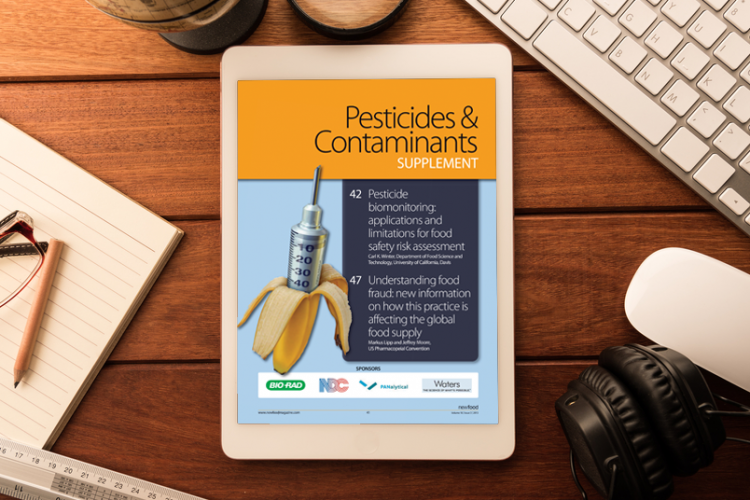Pesticides & Contaminants supplement 2013
- Like
- Digg
- Del
- Tumblr
- VKontakte
- Buffer
- Love This
- Odnoklassniki
- Meneame
- Blogger
- Amazon
- Yahoo Mail
- Gmail
- AOL
- Newsvine
- HackerNews
- Evernote
- MySpace
- Mail.ru
- Viadeo
- Line
- Comments
- Yummly
- SMS
- Viber
- Telegram
- Subscribe
- Skype
- Facebook Messenger
- Kakao
- LiveJournal
- Yammer
- Edgar
- Fintel
- Mix
- Instapaper
- Copy Link
Posted: 24 June 2013 | Carl K. Winter, Markus Lipp, Jeffrey Moore | No comments yet
Pesticide biomonitoring: applications and limitations for food safety risk assessment (Carl K. Winter Department of Food Science and Technology, University of California, Davis)
Novel yeasts, novel flavours (Markus Lipp and Jeffrey Moore US Pharmacopeial Convention)


This free to view Pesticides & Contaminants supplement is sponsored by Bio-Rad, NDC, PANalytical and Waters.
- Pesticide biomonitoring: applications and limitations for food safety risk assessment
Carl K. Winter, Department of Food Science and Technology, University of California, Davis
Biomonitoring techniques have frequently been used to guide estimates of consumer exposure to pesticides and to correlate exposure levels with potential health and behavioural effects. The most common pesticide biomonitoring approaches involve the non-invasive collection of urine and analysis of dialkyl phosphate metabolites that provide indications of exposure to organophosphate insecticides. While this approach is attractive and frequently used, it is limited by several factors that compromise its utility for food safety risk assessment… - Understanding food fraud: new information on how this practice is affecting the global food supply
Markus Lipp and Jeffrey Moore, US Pharmacopeial Convention
Though the term may be relatively new, so-called ‘food fraud’ is by no means a modern-day creation. In fact, known episodes of the intentional, fraudulent replacement of high-value ingredients with inexpensive ones go back centuries, from the adulteration of wine with lead salts in ancient Rome to instances of lowerquality oils being substituted for olive oil throughout history. Likely the most infamous example of the latter in recent times involved denatured rapeseed oil intended for industrial use that was sold as olive oil in Spain in 1981 – a tragedy that caused hundreds of deaths. Horsemeat sold as beef throughout Europe, while fortunately not resulting in a similarly catastrophic health impact, offered a renewed spotlight on the practice of food fraud in 2013. However, beyond the handful of examples that have been well-publicised and the general sense that this is a longstanding problem, not much about food fraud is understood on a broad level…









